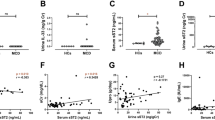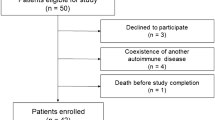Abstract
Earlier studies have demonstrated a strong association of steroid-responsive nephrotic syndrome (SRNS), atopy, and elevated serum IgE levels. Interleukin (IL-13) gene expression is significantly increased in children with SRNS in relapse. As interferon (IFN)-γ, IL-13, and IL-4 have regulatory effects on IgE synthesis, we examined the relationship between intracellular cytokine production and serum IgE levels in children with SRNS, in order to further define the reported association with atopy. The median serum IgE levels in nephrotic patients in relapse with (492 U/ml) or without atopy (561 U/ml) were significantly higher than those in remission (221 U/ml, P<0.002 or 90 U/ml, P<0.001, respectively) and non-atopic controls (177 U/ml) (P<0.001). The percentage of CD3+ IL-13-producing cells was significantly higher in nephrotic children in relapse, and correlated with the serum IgE levels during the active phase of the disease (r=0.90, P<0.001). These data suggest that the elevated serum IgE levels during relapses of SRNS were the result of upregulation of IL-13. This probably reflects some common immune activation following various stimuli, rather than a direct association with atopy.



Similar content being viewed by others
References
International Study of Kidney Disease in Children (1981) The primary nephrotic syndrome in children. Identification of patients with minimal change nephrotic syndrome from initial response to prednisone. J Pediatr 98:561–564
Hardwicke J, Soothill JF, Squire JR, Holti G (1959) Nephrotic syndrome and pollen hypersensitivity. Lancet I:499–502
Wittig HJ, Goldman AS (1970) Nephrotic syndrome associated with inhaled allergens. Lancet I:542–543
Reeves WG, Cameron JS, Johansson SG, Ogg CS, Peters DK, Weller RO (1975) Seasonal nephrotic syndrome. Description and immunological findings. Clin Allergy 5:121–137
Meadow SR, Sarsfield JK, Scott DG, Rajah SM (1981) Steroid-responsive nephrotic syndrome and allergy: immunological studies. Arch Dis Child 56:517–524
Rebien W, Müller-Wiefel DE, Wahn U, Schärer K (1981) IgE mediated hypersensitivity in children with idiopathic nephrotic syndrome. Int J Pediatr Nephrol 2:23–28
Lin CY, Lee BH, Lin CC, Chen WP (1990) A study of the relationship between childhood nephrotic syndrome and allergic diseases. Chest 47:1408–1411
Yap HK, Yip WCL, Lee BW, Ho TF, Teo J, Aw SE, Tay JSH (1983) The incidence of atopy in steroid-responsive nephrotic syndrome: clinical and immunological parameters. Ann Allergy 51:590–594
Florido JF, Diaz Pena JM, Belchi J, Estrada JL, Garcia Ara MC, Ojeda JA (1992) Nephrotic syndrome and respiratory allergy in childhood. J Invest Allergol Clin Immunol 2:136–140
Chan MK, Chan KW, Jones B (1987) Immunoglobulins (IgG, IgA, IgM, IgE) and complement components (C3, C4) in nephrotic syndrome due to minimal change and other forms of glomerulonephritis, a clue for steroid therapy? Nephron 47:125–130
Groshong T, Mendelson L, Mendoza S, Bazaral M, Hamburger R, Tune B (1973) Serum IgE in patients with minimal-change nephrotic syndrome. J Pediatr 83:767–771
Lagrue G, Laurent J, Hirbec G, Ansquer JC, Noirot C, Laurent G, Nebout T, Kestenbaum S (1984) Serum IgE in primary glomerular diseases. Nephron 984:5–9
Mansfield LE, Trygstad CW, Ajugwo RE, Heiner DC (1980) Serum concentrations of immunoglobins E and G and α2 macroglobulin in childhood renal disease. J Allergy Clin Immunol 66:227–232
Schulte-Wissermann H, Gortz W, Straub E (1979) IgE in patients with glomerulonephritis and minimal-change nephrotic syndrome. Eur J Pediatr 131:105–111
Shu KH, Lian JD, Yang YF, Lu YS, Wang JY (1988) Serum IgE in primary glomerular diseases and its clinical significance. Nephron 49:24–28
Yokoyama H, Kida H, Tani Y, Abe T, Tomosugi N, Koshino Y, Hattori N (1985) Immunodynamics of minimal change nephrotic syndrome in adults T and B lymphocyte subsets and serum immunoglobulin levels. Clin Exp Immunol 61:601–607
Warshaw BL, Check IJ (1989) IgG subclasses in children with nephrotic syndrome. Am J Clin Pathol 92:68–72
Mishra OP, Garg R, Usha, Ali Z, Das BK (1997) Immunoglobulins and circulating immune complexes in nephrotic syndrome. J Trop Pediatr 43:93–97
Shakib F, Hardwicke J, Stanworth DR, White RH (1977) Asymmetric depression in the serum level of IgG subclasses in patients with nephrotic syndrome. Clin Exp Immunol 28:506–511
Yap HK, Cheung W, Murugasu B, Sim SK, Seah CC, Jordan SC (1999) Th1 and Th2 cytokine mRNA profiles in childhood nephritic syndrome: evidence for increased IL-13 mRNA expression in relapse. J Am Soc Nephrol 10:529–537
Punnonen J, Aversa G, Cocks BG, McKenzie ANJ, Menon S, Zurawski G, De Waal Malefyt R, Vries JE de (1993) Interleukin 13 induces interleukin 4-independent IgG4 and IgE synthesis and CD23 expression by human B cells. Proc Natl Acad Sci U S A 90:3730–3734
Levy F, Kristofic C, Heusser C, Brinkmann V (1997) Role of IL-13 in CD4 T cell-dependent IgE production in atopy. Int Arch Allergy Immunol 112:49–58
Bacharier LB, Jabara H, Geha RS (1998) Molecular mechanisms of immunoglobulin E regulation. Int Arch Allergy Immunol 115:257–269
Tenbrock K, Schubert A, Stapenhorst L, Kemper MJ, Gellermann J, Timmermann K, Müller-Wiefel DE, Querfeld U, Hoppe B, Michalk D (2002) Type I IgE receptor, interleukin 4 receptor and interleukin 13 polymorphisms in children with nephrotic syndrome. Clin Sci 102:507–512
Picker LJ, Singh MK, Zdraveski Z, Treer JR, Waldrop SL, Bergstresser PR, Maino VC (1995) Direct demonstration of cytokine synthesis heterogeneity among human memory/effector T cells by flow cytometry. Blood 86:1408–1419
Schnaper HW (1989) The immune system in minimal change nephrotic syndrome. Pediatr Nephrol 3:101–110
Giangiacomo J, Cleary TG, Cole BR, Hoffsten P, Robson AM (1975) Serum immunoglobulins in nephrotic syndrome. A possible cause of minimal-change nephrotic syndrome. N Eng J Med 293:8–12
Shalhoub RJ (1974) Pathogenesis of lipoid nephrosis: a disorder of T-cell function. Lancet II:556–560
Kemper MJ, Altrogge H, Ganschow R, Müller-Wiefel DE (2002) Serum levels of immunoglobins and IgG subclasses in steroid sensitive nephrotic syndrome. Pediatr Nephrol 17:413–417
Fuke Y, Endo M, Ohsawa I, Satomura A, Hidaka M, Fujita T, Ohi H (2002) Implication of elevated serum IgE levels in minimal change nephrotic syndrome. Nephron 91:769–770
Capsoni F, Acerbi L, Bonora G, Perletti L, Ongari AM, Vanoli M, Zanussi C (1986) Phagocyte function and immunological findings in a Wiskott-Aldrich syndrome long-term survivor. J Clin Lab Immunol 19:91–97
Kikkawa Y, Kamikura K, Harajima T, Sekiguchi T, Kawai T (1973) Thymic alymphoplasia with hyper-IgE-globulinemia. Pediatrics 51:690–696
Bacharier LB, Geha RS (2000) Molecular mechanisms of IgE regulation. J Allergy Clin Immunol 105:S547–S558
Cho BS, Lee CE, Pyun KH (1992) Studies of the role of interleukin-4 and Fc∈RII in the pathogenesis of minimal change nephrotic syndrome. J Korean Med Sci 7:343–348
Cho BS, Yoon SR, Jang JY, Pyun KH, Lee CE (1999) Up-regulation of interleukin-4 and CD23/Fcepisilon in minimal change nephritic syndrome. Pediatr Nephrol 13:199–204
Kimata H, Fujimoto M, Furusho K (1995) Involvement of interleukin (IL)-13, but not IL-4, in spontaneous IgE and IgG4 production in nephrotic syndrome. Eur J Immunol 25:1497–1501
Acknowledgements
This work was supported by a grant (NMRC/0083/1995) from the National Medical Research Council, Singapore.
Author information
Authors and Affiliations
Corresponding author
Rights and permissions
About this article
Cite this article
Cheung, W., Wei, CL., Seah, CC. et al. Atopy, serum IgE, and interleukin-13 in steroid-responsive nephrotic syndrome. Pediatr Nephrol 19, 627–632 (2004). https://doi.org/10.1007/s00467-004-1438-8
Received:
Revised:
Accepted:
Published:
Issue Date:
DOI: https://doi.org/10.1007/s00467-004-1438-8




